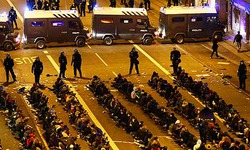Copenhagen police release hundreds of detained activists
Only 13 protesters are still in custody after nearly a thousand arrested during demonstrations at climate change summit
Danish police have released hundreds of activists who were detained during a mass rally to demand a global climate pact, as police were accused of overreacting to sporadic street violence.
Only 13 of the 968 people detained during the demonstration in Copenhagen remain in custody today, according to police. Of those, two Danes and a Frenchman are set to appear in court on preliminary charges of fighting with police.

An estimated 40,000 people joined Saturday’s mostly peaceful march toward the suburban conference centre where the 192-nation UN climate conference is being held.
Riot police detained activists at the back of the demonstration, when some started vandalising buildings in central Copenhagen.
Mel Evans from Climate Justice Action said protesters were held for hours in freezing conditions without water, toilets or medical attention.
“People were very scared and they were held for about four hours on the ground. They weren’t able to have any medical attention, any water, and weren’t allowed to have any toilet facilities,” she told BBC Five Live.
“People were there in freezing conditions urinating on themselves and being held in lines like, essentially like animals.”
Yesterday, the Archbishop of Canterbury, Dr Rowan Williams, speaking in the Danish capital, appealed for people to start loving and caring for their world.
Addressing a congregation including Queen Margrethe of Denmark and senior international politicians he called for a scaling down of the extravagant use of energy and the amount of waste across the planet. “These things will only happen if we learn to love the world we live in,” he said.
Williams, a passionate believer in the need for control of the causes of climate change, has had strong words for those who deny that man’s activities are not responsible for the current phase of global warming.
“Don’t please listen to those who say that there is some kind of choice to be made between looking after human beings and looking after the planet. It is one of the most foolish errors around these days,” he said.
But last night, violence broke out when tens of thousands of people – some dressed as penguins and polar bears, carrying signs saying: “Save the humans” – took to the streets. The march had been organised to urge conference delegates to work out a binding deal to tackle climate change but was marred when a group of protesters threw bricks at police.
Hundreds were arrested and police “kettled” several hundred more before sending coaches into the pen, filling them up and driving away.
Henri Purje, who was in Copenhagen with Attac, a group opposed to international free trade, was standing in front of the group that was penned in and taken away by police.
“I was in the last line of people before the police suddenly moved in for no obvious reason. It seemed as if they just wanted to take out a bunch of random people. No one was being violent, I didn’t see anyone doing anything apart from singing and chanting and marching. Everything had been really peaceful,” Purje said.
A British demonstrator, Georgy Forshall, told the Observer: “Two of my friends are in there. The police said demonstrators had been throwing stones, but my friends were in a cow costume, they wouldn’t have been able to throw stones.”
Police said two Britons had been deported. “There were many thousands on the march. The police knew that some of them were activists. Some of them were throwing stones and in that case we make arrests. The activists also wear masks on their faces and this is illegal under Danish law,” police spokesman Henrik Moeller Jakobsen said.
The disruption marks the halfway point of the climate talks. This week, the UN-sponsored summit enters its final phase with more than 100 world leaders, including Barack Obama, Gordon Brown and Chinese premier Wen Jiabao, arriving to hammer out a deal.
The conference has been characterised by posturing and recriminations but gained focus on Friday with the release of a document outlining ambitious greenhouse gas reductions over the next 40 years.
Industrialised nations will bear most of the burden of emission cuts in the short term, it is proposed. They will reduce their output of greenhouse gases by 25%-45% by 2020, compared with 1990 levels. Major developing countries would reduce theirs by 15%-30%. Together, all countries would cut emissions by 50%-95% by 2050.
However, the text fails to indicate how much money rich countries would give poorer ones to cope with global warming, a major bone of contention. The European Union has pledged to provide £2.2bn a year over the next three years to help poorer countries adapt to the impact of climate change.
Island states, such as the Maldives, the Seychelles and Tuvalu, are the most vulnerable to sea-level rises. They want any treaty agreed at Copenhagen to set a target year, within the next decade, when emissions peak and then begin to fall.
Source: http://www.guardian.co.uk/environment/2009/dec/13/copenhagen-protesters-freed



